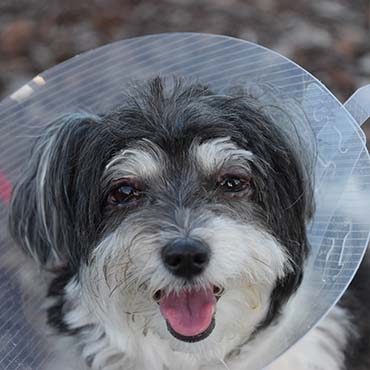Red Eyes and Swollen Eyes in Dogs
Overview
- Most people assumed that redness or swelling in the eyes means infection, however, there are many different conditions that can cause eyes these symptoms.
- Fortunately, most causes are treatable.
- Contact your vet ASAP if you notice anything wrong with your dog’s eye(s), a delay in treatment could lead to more severe problems.
General information
There are many different conditions that cause eyes to become red and/or swollen. Help your vet by telling them about any other symptoms you have noticed, such as, pain, discharge, excessive blinking, holding an eye shut or cloudiness.

Redness and swelling/inflammation in the eyes can be caused by many different conditions.
Causes
Dry eye - a lack of tears that causes the eyes to become dry, red, inflamed and painful.
An eye infection – caused by bacteria (commonly known as conjunctivitis).
Skin allergies - that cause itchy eyes (such as atopic dermatitis).
An eye ulcer - a wound on the surface of the eye that causes painful, weepy, red, inflamed eyes.
Something irritating in their eye - such as smoke, dust, sand, wind, a grass seed, or a cat’s claw!
Eyelash disorders - eyelashes that rub on the surface of the eye often cause pain, redness and swelling.
Eyelid disorders - inward or outward turning eyelids often cause pain, redness and swelling/inflammation.
Glaucoma – increased pressure inside the eye. An eye with glaucoma is usually red, inflamed, cloudy and larger than normal.
Exposure keratitis - a condition common in flat-faced dogs such as the Shih Tzu, Pug and Bulldog because their bulging eyes prevent proper blinking. Exposure keratitis causes the front of the eye to become dry and inflamed.
Uveitis - inflammation of structures inside the eye causes changes in the shape, size or colour of the iris.
Masses and tumours - often cause irritation and inflammation.
When to contact your vet
Contact your vet for an appointment as soon as you notice anything wrong with your dog’s eyes, if they seem to be in pain, ask your vet for an urgent appointment. A delay in treatment could lead to much more serious problems and even loss of vision / blindness.
Find out whether you are eligible for free or low cost PDSA veterinary treatment using our checker or visit www.pdsa.org.uk/eligibility
Published: January 2021
Did you find this page useful?
Tell us more
Please note, our vets and nurses are unable to respond to questions via this form. If you are concerned about your pet’s health, please contact your vet directly.
Thank you for your feedback
Want to hear more about PDSA and get pet care tips from our vet experts?
Sign up to our e-newsletter
Written by vets and vet nurses. This advice is for UK pets only. Illustrations by Samantha Elmhurst.

